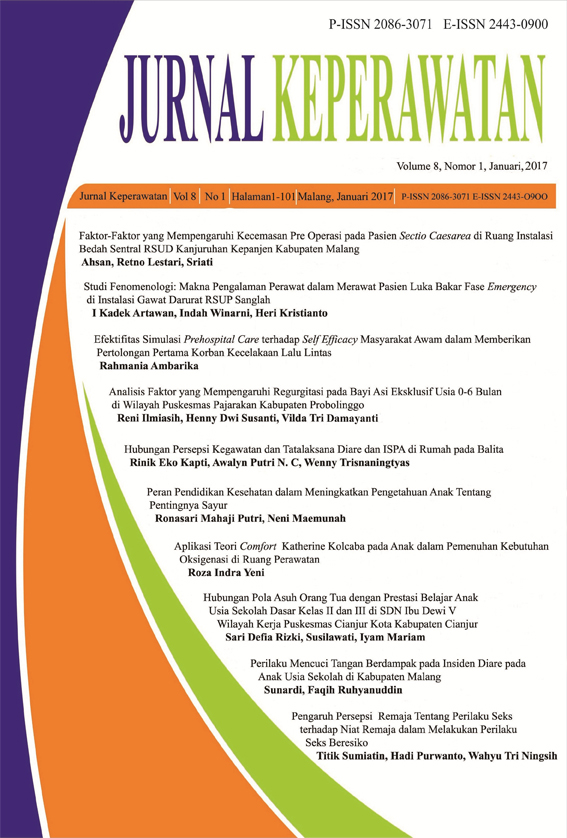The Impact of Hand Washing on the Incident of Diarrhea among School-Aged Children at the District of Malang
DOI:
https://doi.org/10.22219/jk.v8i1.4021Keywords:
Hand washing, behaviour, diarrheae, school-age childrenAbstract
PERILAKU MENCUCI TANGAN BERDAMPAK PADA INSIDEN DIARE
PADA ANAK USIA SEKOLAH DI KABUPATEN MALANG
The Impact of Hand Washing on the Incident of Diarrhea among School-Aged
Children at the District of Malang
1Sunardi, 2Faqih Ruhyanuddin
12Dosen Program Studi S-1 Keperawatan Universitas Muhammadiyah Malang
Kampus II, Jalan Bendungan Sutami No. 188A Malang 65145
1email: sunardinadhif@yahoo.co.id
ABSTRAK
Cuci tangan sering dianggap sebagai hal yang sepele di masyarakat, padahal cuci tangan bisa
memberi kontribusi pada peningkatan status kesehatan masyarakat. Anak-anak usia sekolah
mempunyai kebiasaan kurang memperhatikan perlunya cuci tangan dalam kehidupan sehari-hari,
terutama ketika di lingkungan sekolah. Perilaku tersebut tentunya berpengaruh dan dapat
memberikan kontribusi dalam terjadinya penyakit diare. Cuci tangan merupakan tehnik dasar yang
paling penting dalam pencegahan dan pengontrolan penularan infeksi. Penelitian ini adalah
analisis korelasi. Subyek penelitian anak usia sekolah di kabupaten Malang dengan teknik cluster
sampling yaitu sebesar 300 responden. Analisis data menggunakan uji statistik spearman. Hasil
penelitian perilaku cuci tangan pada anak usia sekolah di Kabupaten Malang pada kategori baik
(53,7 %), cukup (41,7 %) dan kurang baik (4, 6 %). Sedangkan insidensi diare pada anak usia
sekolah di Kabupaten Malang dalam kategori rendah (59,3 %), sedang (37,7 %) dan tinggi (3 %).
Hubungan antara perilaku cuci tangan dan insiden diare diperoleh nilai p = 0,000 yang lebih kecil
dari 0,05 dan r = 0,792, maka secara statistik membuktikan ada hubungan yang signifikan antara
perilaku cuci tangan dan insiden diare.
Kata kunci: Cuci tangan, perilaku, diare, anak sekolah dasar
ABSTRACT
Hand washing behavior considered unimportant thing in community, whereas hand washing can
contribute to improve the health status of the community. School-age children have paying less
attention habit to the need for hand washing in everyday, especially when in the school
environment. The behavior could effect and contribute to the occurrence of diarrhea disease.
Hand washing is the most important fundamental technique in the prevention and control of
infection transmission. This study was the correlation analysis. Research subject are school age
children in Malang with cluster sampling technique that is equal to 300 respondents. Data
analysis is using Spearman. The results of school age children hand washing behavior in Malang
are in good categories ( 53.7 % ), moderate ( 41.7 % ) and poorly ( 4 , 6 % ) . While the incidence
of diarrhea in children of school age in Malang in the low category (59.3 % ), moderate ( 37.7 % )
and high ( 3 % ) . Relationship between hand washing and diarrhea incidence obtained p value =
0.000 is smaller than 0.05 and r = 0.792 , statistically it proves that there was a significant
relationship between the incidence of diarrhea and hand washing.
Keywords: Hand washing, behaviour, diarrheae, school-age children
Downloads
Downloads
Published
Issue
Section
License
Authors who publish with this journal agree to the following terms:
- Authors retain copyright and grant the journal right of first publication with the work simultaneously licensed under a Creative Commons Attribution-ShareAlike 4.0 International License that allows others to share the work with an acknowledgment of the work's authorship and initial publication in this journal.
- Authors are able to enter into separate, additional contractual arrangements for the non-exclusive distribution of the journal's published version of the work (e.g., post it to an institutional repository or publish it in a book), with an acknowledgment of its initial publication in this journal.
- Authors are permitted and encouraged to post their work online (e.g., in institutional repositories or on their website) prior to and during the submission process, as it can lead to productive exchanges, as well as earlier and greater citation of published work (See The Effect of Open Access).

This journal is licensed under the a Creative Commons Attribution-ShareAlike 4.0 International License.














